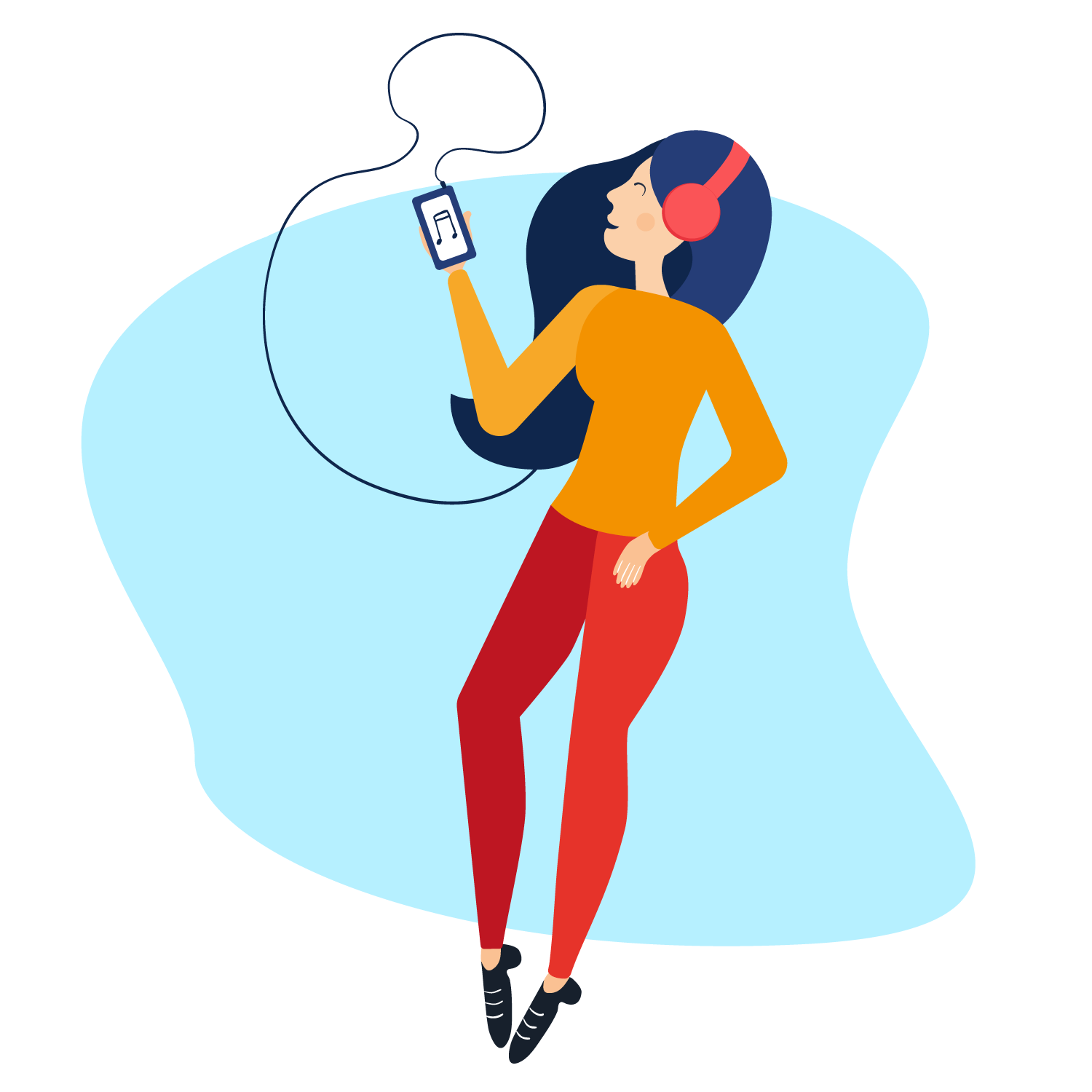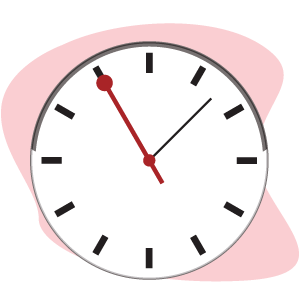
Rate this article and enter to win
Free time in college can feel fleeting. In fact, in a recent CampusWell survey, over 92 percent of students said they at least occasionally feel like they don’t have enough time for themselves, and more than 30 percent said they feel like this every day.
So how can you prevent your schedule from steamrolling you into exhaustion? It’s all about taking breaks.
Take breaks to sharpen your mind
When you have a full to-do list—writing papers, studying for exams, going to work, participating in campus activities—squeezing in leisure time can feel like a luxury, but it’s actually necessary.
If you’ve ever tried to power through a long study period or creative task with no breaks, you probably know what it’s like to hit a wall—that point where you’re no longer productive. This happens because your brain is structured to need both periods of work and rest.
 Have you ever heard someone say, “I think best in the shower,” or “I’m going to take a walk and clear my head?” These aren’t just quaint sayings. Taking a break gives your brain time to process all the information you’ve thrown at it, according to research.
Have you ever heard someone say, “I think best in the shower,” or “I’m going to take a walk and clear my head?” These aren’t just quaint sayings. Taking a break gives your brain time to process all the information you’ve thrown at it, according to research.
When you allow your brain to rest, it begins using the default mode network (DMN), which can boost creativity and help you link ideas, retrieve memories, and become more self-connected, according to research outlined in the Harvard Health Blog.
Here are some science-backed ways to give your brain a break:
- Walking or getting some heart-pumping exercise (bonus points if you do it in nature)
- Napping
- Daydreaming (especially about something fun or playful)
- Meditation
“Taking time for [myself] is important to avoid burnout,” says Amy R., a graduate student at Seattle University in Washington, who also works full time. “I also find that sometimes taking a break from a project helps me get to the idea I’ve been searching for.”
In the world-renowned book, The 7 Habits of Highly Effective People®, author Stephen R. Covey’s seventh suggestion was “Sharpen the Saw.” Here, he told the story of a man who gets exhausted trying to cut down a tree with a dull saw but continues anyway. If he’d stop and take time to sharpen his saw, the break would help his progress. The same is true for you: Taking a break to recharge is a way to sharpen your thinking, reflexes, and emotional resilience.
It’s also necessary for your physical health. “Studying is hard work,” says Vicki B., a sophomore at the Alamo Colleges in San Antonio, Texas. “I think resting after studying is just as important as after exercising.”
You time
What should your break be like? The answer depends on what sorts of activities you find soothing or energy boosting.

“I like to listen to music, meditate, pray, light a good [smelling] candle, or even step outside for a moment.”
—Alia D., first-year undergraduate, Atlanta Institute of Music and Media
“[I] work out, play video games, [or] go to hockey games.”
—Jayden C., first-year undergraduate, Michigan Technological University
Take a moment to think about when you feel most relaxed or even excited. “You time” is just that: for you. It doesn’t have to seem appealing to anyone else. For Amy, tap dancing brings her joy, but tidying up helps too. “Having a clean apartment makes it much easier to focus on homework, and I also find I sleep better and feel more energized,” she explains.
Unplug, literally
A little mindless TV can be fine, but vegging out in front of electronic devices won’t give your brain relief from the eye strain and multitasking associated with technology.
“I feel more tired if I work for a long time at my computer or watch TV for a while. It most likely stems from my eyes being strained and wearing out my brain.”
—Tijana S., third-year undergraduate, Stonehill College, Easton, Massachusetts

At least once a day, even if just for half an hour, set aside your computer, tablet, phone, and headphones. Find a quiet place, or connect with some friends in person. It’s essential to shift your energy toward real human connection on a regular basis and also have time to reach a peaceful state.
In our tech-obsessed world, overstimulation can feel like the norm. Here are some ideas for finding calm:
- Keep a gratitude log
- Do some yoga or meditation
- Practice tai chi
- Turn off your WiFi for a certain amount of time each week
- Spend time in nature
- Leave your phone at home for a few hours
- Take a relaxing bath or shower
- Find a quiet spot and practice deep breathing
- Draw or write for pleasure
- Play or create music
- Eat lunch alone with a favorite book or a journal
- Go on a tech-free walk and take time to observe your surroundings
- Have a meaningful phone or face-to-face conversation
Schedule breaks into your day
 Now the key is to figure out when to take a break. Some students set a regular schedule, putting time for themselves in their calendars—just as they would a lecture, doctor’s appointment, or other responsibility. Otherwise, the time may be frittered away or seem like something expendable.
Now the key is to figure out when to take a break. Some students set a regular schedule, putting time for themselves in their calendars—just as they would a lecture, doctor’s appointment, or other responsibility. Otherwise, the time may be frittered away or seem like something expendable.
“A time management schedule that includes regrouping is a well-planned schedule.”
—Sherry H., online student, Ashford University
Jake makes sure to schedule some time each day for himself, which he adjusts every quarter depending on his commitments. “I’m a morning person, so I like waking up really early and having that time before I have to be out and about,” he says.
Your big break
 Taking little breaks during the school year is important, but longer periods of time off (like summer and winter breaks) are great times to try something new. If you find some things challenging during the school year, such as eating regular, nutritious meals or keeping up with your class reading, you can also use a break from school to refocus and reset your habits.
Taking little breaks during the school year is important, but longer periods of time off (like summer and winter breaks) are great times to try something new. If you find some things challenging during the school year, such as eating regular, nutritious meals or keeping up with your class reading, you can also use a break from school to refocus and reset your habits.
“Breaks are the perfect opportunity to establish healthier habits,” says Chitra D., a senior at Purdue University in West Lafayette, Indiana. “Having time away from school is a time to figure out your priorities outside of academics.”
For example, Amy started training for a half marathon during her winter break and kept it up in subsequent semesters, while Jake has spent summers working on farms in Spain and Ireland.
Take some time to evaluate if you’re meeting your own goals. If not, you can set priorities and create an action plan. Just make sure the plan includes time to recharge. However you choose to spend “you time” or your summer break, take the break part seriously and enjoy the benefits of having balance in your life.
Why your brain needs more downtime: Scientific American
How do work breaks help your brain?: Psychology Today
Covey, S. R. (1989, 2004). The 7 habits of highly effective people. New York, New York: Free Press.
Immordino-Yang, M. H., Christodoulou, J. A., & Singh, V. (2012). Rest is not idleness: Implications of the brain’s default mode for human development and education. Perspectives on Psychological Science, 7(4), 352–364.
Jabr, F. (2013, October 15). Why your brain needs more downtime. Scientific American. Retrieved from https://www.scientificamerican.com/article/mental-downtime/
Pillay, S. (2017, May 9). Secret to brain success: Intelligent cognitive rest. Harvard Health Blog. Retrieved from https://www.health.harvard.edu/blog/secret-to-brain-success-intelligent-cognitive-rest-2017050411705
CampusWell survey, June 2013.
CampusWell survey, March 2019.



























